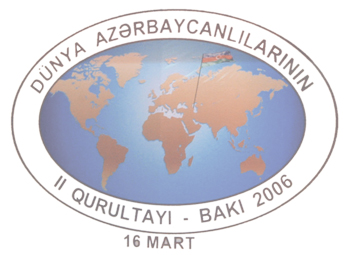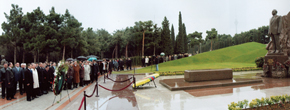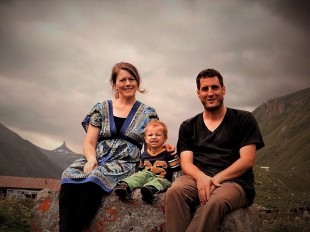 WHO ARE WORLD AZERBAIJANIS?
WHO ARE WORLD AZERBAIJANIS?Before reporting on the second World Azerbaijani Congress, we think it appropriate to give a short explanation of the term "World Azerbaijanis". This encompasses both Azerbaijanis who live in the Azerbaijani Republic and those who live beyond its borders. This formula is not so problematic for nations whose historical and geographical territory coincides with their political borders. But the Azerbaijani Republic, the sole Azerbaijani state in the world, represents only a part of Azerbaijan’s historical and geographical territory. In the past 200 years of their history Azerbaijanis have never seen the terms "motherland" and "state" coincide. Azerbaijan has been divided as a country, so the Azerbaijanis are representatives of a dispersed people. Although they represent one Azerbaijani people in terms of language, culture, identity, religion, history, origins, national psychology and mindset, they remain different in legal and political terms as well as in citizenship.
Azerbaijan does not make any territorial claims on the lands that historically belonged to it. Most of these lands are at present in neighboring states. However, the Azerbaijanis who live in those areas, as well as other diaspora Azerbaijanis, feel the political and moral support of the Azerbaijani Republic. Despite political borders this support protects the ethnic identity of the historical and geographical area. This approach is needed to counter the policy of disregard for the ethnic cleansing and deportation of Azerbaijanis from their historical settlements and of limiting their rights and national identity (a clear example is the ethnic cleansing of Azerbaijanis who lived in Western Azerbaijan, now part of the Armenian Republic). At the moment this policy of disregard and limitation is carried out towards the 30 million Azerbaijanis living in Southern Azerbaijan, part of Iran.
N.B. Azerbaijan was divided into two parts - Northern and Southern Azerbaijan - as a result of the Russo-Persian wars (1804-1813, 1826-1828). Northern Azerbaijan, covering 35 per cent of the whole country, fell under the rule of Russia, while Southern Azerbaijan, 65 per cent of the country, fell under Persian rule.
WORLD AZERBAIJANI CONGRESS
The World Azerbaijani Congress is held every five years. The first congress was held in 2001 in Baku, while a presidential decree set the date of the second congress as 16 March 2006, also in Baku. The second congress had the aim of maintaining national unity in the country, strengthening solidarity between Azerbaijanis throughout the world, analysing the problems of Azerbaijanis living in foreign countries and the present position in terms of unity and organisation, discussing forthcoming objectives to strengthen their connections with the Republic of Azerbaijan, representing to the world community the truth about our country and improving work to create a diaspora.A total of 1,231 representatives were selected for the congress: 593 representatives from 49 countries and 638 from the Azerbaijani Republic. The congress was also attended by 388 guests from abroad and 625 from Azerbaijan.
The largest delegations were from Russia (200 people), Turkey (116), Ukraine (85), Germany (53), Georgia (40), the USA (38), France (27), Kazakhstan (25), Sweden (23), the UK (16), Belarus (15), the Netherlands (14), Latvia (14), Canada (13), Estonia (13) and Austria (10). Representatives from Australia, the United Arab Emirates, China, Bulgaria, Israel, the Czech Republic, Spain, Italy, Hungary, Egypt, Poland, the Turkish Republic of Northern Cyprus, Tajikistan, Turkmenistan, Japan, New Zealand, Greece, Ireland and Taiwan took part in the congress for the first time.
Representatives from the regions of the Azerbaijani Republic were also invited to the congress. The 638 Azerbaijani representatives came from state and government organs, social organisations, science, education and cultural institutions and political parties. Sixty-four guests from state and government structures and parliament members also took part. The guests included the deputy chairman of the Turkish Justice and Development Party, Shaban Dishli, the then Kyrgyz state secretary, Dastan Sarygulov, Lithuanian presidential adviser Halina Kobeckaite, French diplomat and France’s first ambassador to Azerbaijan Jean Perrin, Japan’s previous ambassador to Azerbaijan, Toshiyuki Fujiwara, former German State Secretary Otto Hauser, Michael Nobel, a great grand nephew of Swedish millionaire Alfred Nobel, and other eminent figures.
STRONG AZERBAIJANI DIASPORA BEING FORMED
Since the first World Congress of Azerbaijanis, more than 80 new communities have been established in America, Europe, Asia and North Africa as a result of coordination between Azerbaijanis living abroad and state and government structures in Azerbaijan. There are now 300 such communities, which work well together.The main problem discussed at the congress was the Armenian-Azerbaijan conflict over Mountainous Karabagh. Devoting most of his speech to this problem, Ilham Aliyev said: "I want to note once more the great role of the Azerbaijani diaspora in this area. I want this role to increase in raising Azerbaijan’s profile in the world and keeping the global community informed about Azerbaijan’s realities. Azerbaijanis must be more actively involved in the social and political life of the countries where they live." The president said that he relies on the 50 million Azerbaijanis in the world in resolving the problems of Azerbaijan. Ilham Aliyev said that the Azerbaijani diaspora should help the government to carry out foreign policy.
The importance was noted of combining the role of the Azerbaijani diaspora under the banner of one organization. The congress also discussed the creation of a special working group to plan strategy to combine the efforts of the Turkish and Azerbaijani diasporas.
AZERBAIJANI RIGHTS IN IRAN
A problem of great concern to Azerbaijanis throughout the world is the issue of South Azerbaijan, which is part of Iran. This was the last item on the congress agenda. Much was said about the violation of the human rights of Azerbaijanis in South Azerbaijan. According to unofficial figures, nearly 30 million ethnic Azerbaijanis live in Iran. The participants lashed out at the Iranian authorities for denying them the right to study in their own language. Azerbaijani leaders complained about the limited use of the Azerbaijani language in schools and the media and said that the authorities imprisoned Azerbaijani political activists. Javad Derakhti, chairman of the World Azerbaijani Congress, criticised the Iranian authorities for destroying the cultural heritage of Azerbaijanis living in Iran. But these views sparked an angry protest from the Iranian embassy. The embassy sent even a protest note to the Foreign Ministry of the Republic of Azerbaijan and expressed deep regret at the participation of "anti-Iranian elements" in the congress.DECISIONS OF THE CONGRESS
The congress ended with the adoption of a resolution. The resolution covered economic development, strengthening the military, integration into the world community, resolution of the Mountainous Karabagh conflict and also the organisation of Azerbaijanis in different countries. The participants advised state bodies and diaspora organisations to unite communities and other groups functioning separately in different countries, to establish a Congress of American Azerbaijanis and a Congress of Asian Azerbaijanis and to work towards the formation of one organization that would coordinate the work of all Azerbaijanis living abroad in assisting Azerbaijan.The congress adopted a number of appeals including to the president of the Republic of Azerbaijan, to Azerbaijanis throughout the world, to UNESCO and to Azeri and Turkish diaspora organizations. The congress also appealed to the international community, parliaments, heads of governments and states on the Mountainous Karabagh conflict.
Organisational issues were also considered. The new structure of the World Azerbaijani Coordination Council was defined. The president of the Republic of Azerbaijan, Ilham Aliyev, was elected chairman of the World Azerbaijani Coordination Council. The president of the Azerbaijani Academy of Sciences, Mahmud Kerimov, was elected chairperson of the Board of the World Azerbaijani Coordination Council. A total of 109 people were elected to the Coordination Council.
"The nation of Azerbaijan is great. There are 50 million of us. This is a large number in international terms. We all have one Homeland - Azerbaijan. We must try to strengthen and enrich our Homeland and make it a powerful state. I wish us all success in this endeavour." Ilham Aliyev, President of the Republic of Azerbaijan.



